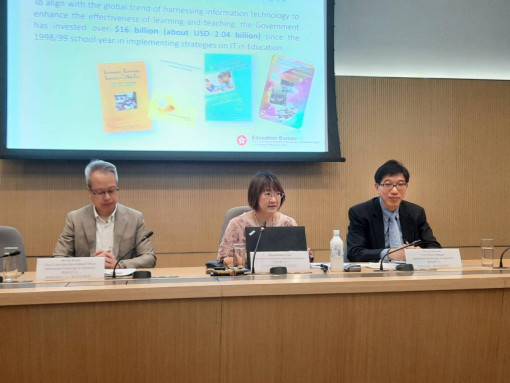
Hong Kong is ready to work with Thailand to promote the use of educational technology to help students learn more effectively and allow teachers to create customised lessons and increase classroom participation.
The venture was raised at Hong Kong’s recent Edtech Month Summit 2023, a month-long programme of activities on education technology. It included discussion panels on how technology can reshape and contribute to education systems, not only in Hong Kong but at the global level.
Katherine Choi, Principal Assistant Secretary (Education Infrastructure) at the Hong Kong Special Education Bureau, who is responsible for promotion of educational technology, said Thailand could follow in Hong Kong’s footsteps in the implementation of Information Technology in education.
Ms Choi was speaking on how Hong Kong has implemented education technology systematically and effectively.
“We welcome collaboration opportunities with other countries including Thailand on EdTech. Hong Kong Special Administrative Region [HKSAR] and the Government’s Economic and Trade Office in Bangkok could help communication on both sides,” she said.
She said Hong Kong’s multi-faceted approach to IT in education, through working on infrastructural and mobile hardware, as well as software such as training, peer group support, promotion of information literacy, and through involvement of different stakeholders, may serve as a good reference for Thailand in mapping out its focus of work on this front.
Ms Choi said that to align with the global trend of harnessing information technology to enhance the effectiveness of learning, the HK government had invested over about US$2.04 billion (about 73.7 billion baht) since the 1998/99 school year in implementing strategies on IT education.
Since then, the Hong Kong government has been trying to advance school infrastructure such as providing Wifi support in govt’s funded public schools.
“We have established Wifi campus for all public-funded schools [about 1,000 schools] in Hong Kong, which allows students to use mobile computing devices for e-learning anywhere on campus. Each school now, on average, owns over 200 mobile computer devices for learning and teaching,” she said.
Furthermore, the Hong Kong government has provided the e-learning subsidies under the “Composite Information Technology Grant (CITG)”.
She said that each school is disbursed with CITG annually ranged from US$33,900 to $110,600 in the 2022/2023 school year depending on the school type and number of classes.
“Schools may deploy the recurrent grant to subscribe Wifi services; purchase and enhance different software and hardware for online teaching; and strengthen IT staffing support,” she added.
She said the Hong Kong government also had the Information Technology Staffing Support Grant (ITSSG), in which each school would be disbursed with a recurrent sum of $42,500 a year and could deploy the money to strengthen its IT staffing support.
To strengthen teachers’ knowledge of technology, the Hong Kong government has launched the Professional Development Programmes (PDPs) that covers the topic on applying various emerging technologies in learning and teaching.
They include pedagogy, Stem (Science, Technology, Engineering and Mathematics) related subjects, e-Leadership, technology, information literacy and blended learning. The PDPs offered over 300 training events with over 20,000 participants per year, she said.
Ms Choi said while technology had made great contributions to children’s development, it also had exposed Hong Kong’s children to dis/misinformation, internet addiction and cyberbullying.
“Many children who have suffered from cyberbullying in Hong Kong have found the solution to be to delete their [social media] accounts to avoid attacks. So, we need to prepare our students to become literate in IT,” she added.
The Education Bureau launched the Information Literacy for Hong Kong Students framework to ensure information and technology literacy among their students. It encompasses nine literacy areas, which aim to develop students’ knowledge, skills, and attitudes.
Those are: using technology effectively; identifying and defining a need for information; locating information; evaluating information; extracting information and presenting new ideas; applying IT skills to produce content, recognising reliable sources and the roles and functions of information providers; and emerging ethnical issues arising from advanced IT.
The education bureau has also strengthened the teachers’ information literacy through PDPs through offering both basic and advanced levels of information literacy, which aims to train and enhance teachers’ understanding of emerging information technologies, and aptitude in planning, implementing and evaluating the information technology curriculum.
“The Education Bureau has been providing teachers with e-learning resource kits, and collaborating with different government departments and NGOs,” she said.
“For example, we have got assistance from Hong Kong police in providing the information on scams, intellectual properties and fake news to produce teaching materials to assist schools in teaching information literacy to students.”

